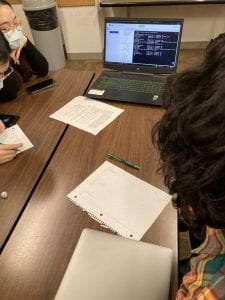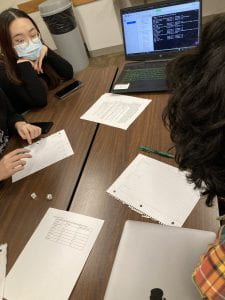Mental Health Final Project Game:
Description: The Mental Health Game is a 2-4 player semi-cooperative game where players have to survive a total of ten weeks, representing a real-life shortened college semester, by completing tasks each week. These tasks will represent what any normal student would go through where if the tasks aren’t completed, there will be some sort of punishment, whether it be your grade being lowered or your mental health being lowered. The main goal of the game is to complete all the tasks every single week and survive ten weeks without reaching a failing grade, or 60%.
Rules and Setup:
-
- 2-4 players
- Sheets of Paper for keeping Mental Health, Score, and Energy every round.
- 2 6-sided dice for energy
- Every week, players randomly receive 3 tasks that they must complete or they will receive some sort of punishment
- Players start at 100% for grades. If the students grades reach 60%, they are out of the game
- Mental Health starts at 5 where the highest it can reach is 10 but can go lower than 0
- Players can bring over a maximum of 2 energy per week
- Players can trade 1 Mental Health for 1 energy unless your Mental Health value is less than 0.
- Players gain 1 Mental Health each week
Majors:
-
- Each Player rolls a 2 6-sided dice to decide their major at the start of the game. Players with the greatest roll value can pick their major first. These will give small bonuses or negatives towards the players depending on the tasks.
- Business
- Projects and Homework tasks take 50% less energy
- Pre-Med
- Tests and Quizzes tasks take 50 % more energy and failure means taking 1% more.
- Computer Science
- Projects and Homework tasks take 50% more energy
- Psychology
- Mental Health benefits give 50% more. Mental Health negatives are 50% less.
- Business
- Each Player rolls a 2 6-sided dice to decide their major at the start of the game. Players with the greatest roll value can pick their major first. These will give small bonuses or negatives towards the players depending on the tasks.
Code for Game (Randomizing Tasks Every Week): https://replit.com/@tsai-me/GameFinalProject
Tasks: List of Tasks: Anything with Group in front can be split between two or more players. Anything with Finals in front is for the last week of the game.
| Name: | Energy | Failure |
| Homework | 1 | -2% |
| Project | 3 | -4% |
| Group Homework | 3 | -3% |
| Group Project | 5 | -5% |
| Daily Chores | 2 | -1 Mental Health |
| Classes | 2 | -1% |
| Labs | 1 | -1% |
| Quiz | 2 | -3% |
| Tests | 3, -1 Mental Health | -5% |
| Study | 1, (If you study on the same week with the test, you don’t lose mental health) | Nothing |
| Cumulative Studying | 1 (Each time you perform this task, the final week tasks would cost .5 less energy. | Nothing |
| Finals: Test | 4, -2 Mental Health | -10% |
| Finals: Project | 6 | -10% |
Mental Health Tasks: List of Mental Health Tasks that the Players can decide on doing whenever they want during the game.
| Activity | Energy | Mental Health Gain |
| Hanging out with Friends | 1.5 | 1 |
| Hobbies | 1.5 | 1 |
| Sleep | 2 | 1.5 |
| Exercise | 2 | 1.5 |
| Read | 1 | .5 |
| Meditate | 1 | .5 |
Winners: The students that survived ten weeks of the college semester graduate. However, they soon realize that they will either have more semesters or graduate and go into the real world, facing the exact same issues of balancing their energy, mental health, and grades or work life wherever they go. They still see the sacrifice in mental health for better grades or better job opportunities or workload where they must constantly sacrifice mentally to essentially “survive” in a stereotypically world.
Artist Statement:
One of the most important aspects of an art game is that the game’s mechanics speak in some way to the player, creating some sort of underlying message that can somewhat criticize or shine light on a certain topic. While brainstorming ideas, I realized that I wanted to create a game that has some sort of impact on my daily life, specifically about a community that I am heavily involved in, while also including commentary on that community about its stereotypical norms. Thus, I created the Mental Health Game which wishes to speak about stereotypical college norms and how that affects any student’s daily life which then ultimately speaks about the mental health of students in college. This idea was inspired by reading about the ending of the art game Braid and the meaning behind Braid where I also wanted to create an impactful game that can be applicable to many people. Braid speaks about the obsession of people when working towards a goal where they can become so obsessed to the point of not understanding the circumstances of some of their actions. This is further reinforced with its main mechanic of time travel where the main character sees the mistakes that he made and only focuses on correctly performing the necessary actions to continue yet he still doesn’t realize the fault in even trying to continue. Many more games that we discussed in class and from the book Works of Games, such as The Marriage or the Passage, contribute to creating some sort of art game that can attribute or comment on a certain aspect of daily life or a controversial topic. The Marriage talks about the relationship and connection between couples while Passage also sneakily talks about the same message but in another way. Learning about all these different art games inspired me to create the Mental Health Game where I want to solely focus on the mechanic of trading a mental health value for an energy value. I wanted my game to somehow speak to the way many college students feel where they have to sacrifice their personal well being, whether it be mental or some other factor, to maintain their grades up to the standard they want them to be. To further create a realistic game, creating effects for picking majors creates the stereotypical feel of what many people believe what some majors actually feel in terms of mental health. Overall, I believe my message that sacrificing mental health becomes a key factor for any college student where sometimes maintaining their energy, mental health, grade, or any other factor becomes challenging. Furthermore, as college students graduate, they realize that they are stuck in a cycle of sacrificing mental health with other aspects of their lives.



Players deciding on how they should spend their energy depending on their major, amount of energy given, and the given tasks for that week. The laptop shows the tasks and the players write down the three values of Mental Health, Grade, and Energy.
